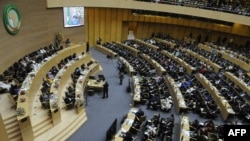Heads of state and government will meet at a summit organized by the African Union (AU) at Ethiopia’s capital, Addis Ababa, on Thursday.
Erastus Mwencha, deputy chairman of the AU says discussions on peace and security will be high on the agenda following recent security concerns in several countries including Africa’s newest nation, South Sudan, Central African Republic (C.A.R), and Somalia.
He acknowledged that the AU faces challenges of security across the continent that need to be resolved so that countries embroiled in conflict can return to constitutional rule.
“This summit will be looking at implementation issues, particularly looking at the area in peace and security [and] they will be looking at development agenda,” said Mwencha. “We will take an opportunity looking at issues to do with what we call agenda 2053, where Africa should be going, and what Africa should be looking at in its development agenda. The summit will [also] look at post 2015 agenda and many international issues.”
Mwencha hailed AU cooperation with its international partners, who he says are helping with security issues in several countries.
“In all these security challenges, Africa has taken a lead role and of course appreciates the support that we are getting from the international community,” said Mwencha.
‘The main thing on the ground is to see that there is progress and that Africa is not only leading but those countries assume their own responsibilities. Because at the end of the day peace cannot be brought from any external resources, it must be internally generated,” said Mwencha. “And the effort of the African Union is to accompany those countries so that they themselves can move out of the crisis.”
Mwencha says the AU is moving forward on creating a force that could be quickly engaged in conflict resolution – something critics have said is long overdue.
“The AU has been implementing what we call the African Peace and Security Architecture, which has several components; [including] early warning system, standby force, conflict mediation and many other aspects of it,” said Mwencha. “The question is the modalities, and how soon we can have it. The plan was to have the standby force by 2015.”
He says African leaders will discuss at the summit a feasible time table to establish the AU standby force.
“The heads of state have to look at what the best time table is, and we leave it to them. We leave it to them to discuss and give us the necessary guidance as they may deem it,” said Mwencha.
Erastus Mwencha, deputy chairman of the AU says discussions on peace and security will be high on the agenda following recent security concerns in several countries including Africa’s newest nation, South Sudan, Central African Republic (C.A.R), and Somalia.
He acknowledged that the AU faces challenges of security across the continent that need to be resolved so that countries embroiled in conflict can return to constitutional rule.
“This summit will be looking at implementation issues, particularly looking at the area in peace and security [and] they will be looking at development agenda,” said Mwencha. “We will take an opportunity looking at issues to do with what we call agenda 2053, where Africa should be going, and what Africa should be looking at in its development agenda. The summit will [also] look at post 2015 agenda and many international issues.”
Mwencha hailed AU cooperation with its international partners, who he says are helping with security issues in several countries.
“In all these security challenges, Africa has taken a lead role and of course appreciates the support that we are getting from the international community,” said Mwencha.
‘The main thing on the ground is to see that there is progress and that Africa is not only leading but those countries assume their own responsibilities. Because at the end of the day peace cannot be brought from any external resources, it must be internally generated,” said Mwencha. “And the effort of the African Union is to accompany those countries so that they themselves can move out of the crisis.”
Mwencha says the AU is moving forward on creating a force that could be quickly engaged in conflict resolution – something critics have said is long overdue.
“The AU has been implementing what we call the African Peace and Security Architecture, which has several components; [including] early warning system, standby force, conflict mediation and many other aspects of it,” said Mwencha. “The question is the modalities, and how soon we can have it. The plan was to have the standby force by 2015.”
He says African leaders will discuss at the summit a feasible time table to establish the AU standby force.
“The heads of state have to look at what the best time table is, and we leave it to them. We leave it to them to discuss and give us the necessary guidance as they may deem it,” said Mwencha.





